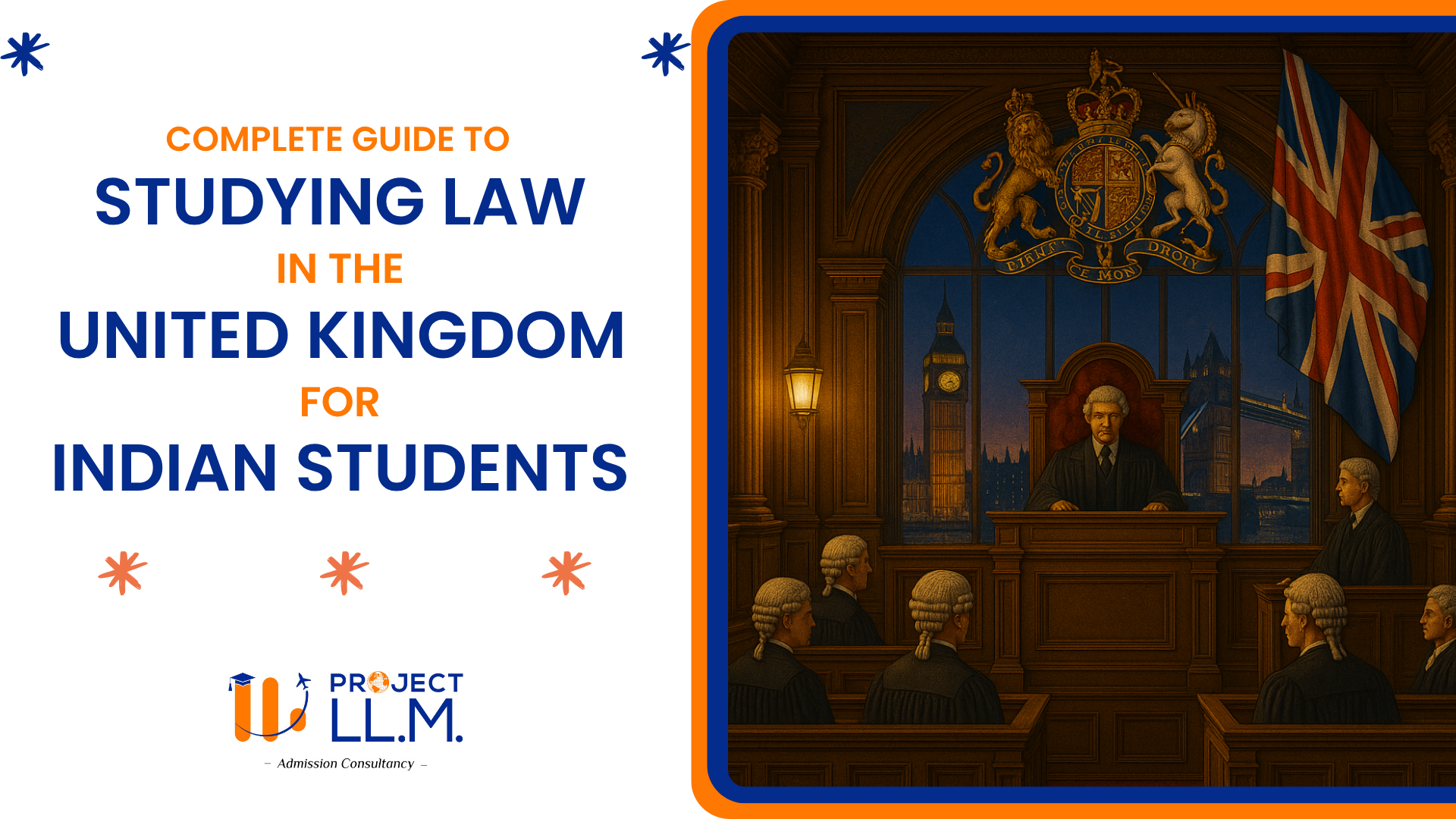Dubai is quickly emerging as a global education hub, offering Indian student’s multiple options to pursue a law degree in a dynamic and internationally connected environment. Whether through UAE-based institutions or international branch campuses, students can start their journey toward a legal career right after completing Class 12. This study LLB in Dubai guide offers a detailed overview of the LLB pathway in Dubai—covering education structure, admission requirements, timelines, career outcomes, costs, and available legal study routes.
Legal Education Structure for Studying Law in Dubai
Dubai provides several routes for Indian students to pursue an undergraduate law degree (LLB or equivalent) directly after Class 12. Both CBSE and ISC marksheets are recognized by universities in the UAE, making eligibility straightforward.
LLB Program Duration in Dubai
Varies from 3 to 5 years, depending on the university and curriculum structure.
Types of Institutions Offering LLB Program in Dubai
- UAE-Based Universities
- Focus on UAE civil law and Sharia law
- Suitable for students looking to build a legal career within the Gulf region.
- International Branch Campuses
- Campuses of UK, US, Indian, French, and Australian universities located in Dubai
- Offer LLB programs based on English common law or comparative international law
- Often align with global legal standards, opening pathways beyond the UAE
Admission Requirements for Indian Students
1. Résumé / CV
A 1–2 page document showcasing academic history, internships, leadership, and extracurricular achievements.
2. Academic Performance
- Class 10 to 12 marks required.
- Most universities expect:
- CBSE/ISC: Minimum 65–80% in Class 12.
- IB Diploma: Minimum 24 points (28–30+ for competitive programs).
- No specific subject combinations required.
3. Standardized Tests
- Generally not required.
- Admissions are based on academic performance and supporting materials.
4. English Proficiency
IELTS or TOEFL usually required unless waived due to high English marks in Class 12.
5. Personal Statement
A 500–800 word essay explaining your interest in law, career aspirations, and academic journey.
6. Letters of Recommendation
Usually 2 to 3, from teachers or internship supervisors.
7. Interview
Some universities conduct informal video interviews to assess communication skills and motivation.
8. Application Platform
- No centralized portal—applications must be submitted individually through each university’s platform.
- Some UK-affiliated campuses may also appear on UCAS (UK application system).
LLB in Dubai – University Application Timelines
| Applications Open | September to December |
| Review of Applications | November to March |
| Offer Letters Released | January to April |
| Visa and Documentation | May to July |
| Course Start | Late August to Early September |
Practicing Law in the UAE after LLB
- Only UAE nationals may appear as advocates in UAE courts.
- Foreign Nationals, however, are eligible to register as Legal Consultants with the Dubai Legal Affairs Department (DLAD).
- Legal consultants are hired by international law firms, local firms, and in-house legal departments of corporates as paralegals, trainees, or junior associates. Consultants may advise and draft but cannot represent clients in court.
- To register as a Legal Consultant, non-UAE nationals with an LLB from a Dubai/UAE university1 needs at least one year of continuous legal experience.2
Applicants must meet Federal requirements: they generally need a bachelor’s degree, have graduated within the last two years, and either be in MOHRE skill level 1–3 or from a university ranked in the top 500 by the UAE Ministry of Education’s list. Financial solvency (ability to support oneself) and an attested degree certificate are also required.
Post-Study Visa Options After LLB in Dubai
- After completing their studies graduates apply for UAE’s job-seeker visa (visit visa for work purposes), a short-term visit visa (60, 90 or 120 days) specifically designed to look for work without a sponsor.3
- If a graduate secures employment, the employer will then apply for a Applicants must meet Federal requirements: they generally need a bachelor’s degree, have graduated within the last two years, and either be in MOHRE skill level 1–3 or from a university ranked in the top 500 by the UAE Ministry of Education’s list. Financial solvency (ability to support oneself) and an attested degree certificate are also required.employment/work visa.
- If graduates are unable to secure employment, they must leave the country when their visa expires unless they obtain another valid permit (switch to a tourist visa or similar).
Estimated Cost of Attendance: LLB in Dubai
| Cost Component | Middlesex University Dubai | University of Birmingham Dubai | American University in the Emirates | Amity University Dubai |
| Annual Tuition Fee (2024–25) | 60,000 AED | 115,000 AED | 65,000 AED | 35,000 AED |
| Estimated Annual Living Costs | 50,000 AED | 50,000 AED | 50,000 AED | 50,000 AED |
| Total Annual Costs | 110,000 AED | 165,000 AED | 115,000 AED | 85,000 AED |
| Costs for Three Years | 330,000 AED | 495,000 AED | – | – |
| Costs for Four Years | – | – | 460,000 AED | – |
| Costs for Five Years | – | – | – | 425,000 AED |
| Converted to Rupees at 1 AED = 23 INR | 75,90,000 INR | 1,13,85,000 INR | 1,05,80,000 INR | 97,75,000 INR |
Note: Additional 1-year experience for legal consultant registration is to be considered. Scholarships are available and may ease financial pressure.
Possible Study Pathways for Indian Students
Depending on your career goals, here are the primary legal education options:
- 3-Year LLB from:
- Dubai-based UK-affiliated university or
- A UK university directly
- 5-Year Integrated LLB in India followed by:
- Optional 1-year LLM or diploma program in Dubai or elsewhere
- Work experience and legal consultant pathway in the UAE
Not sure whether this jurisdiction is the best choice for you or not? Read our article on Key Factors to Consider When Choosing a Country for Studying Law Abroad for better decision making.
- Non-UAE National who has obtained the academic qualification in law from outside the UAE must provide evidence of (3) years continuous legal experience. OR Legalised copy of an academic degree in law from a recognised academic institution + Valid legalised professional legal qualification issued by the regulator of the legal profession within the country from which the qualification was obtained. ↩︎
- The applicant must work full-time in a licensed Dubai law firm on a valid UAE residency/work visa and have no other employment or commercial activity. ↩︎
- Applicants must meet Federal requirements: they generally need a bachelor’s degree, have graduated within the last two years, and either be in MOHRE skill level 1–3 or from a university ranked in the top 500 by the UAE Ministry of Education’s list. Financial solvency (ability to support oneself) and an attested degree certificate are also required. ↩︎
FAQs – Studying Law (LLB) in the Dubai for Indian Students
Can Indian students study law in Dubai after Class 12?
Yes, Indian students can apply to law schools in Dubai directly after Class 12 (CBSE or ISC). Most universities accept marksheets from Indian boards and offer 3–5 year LLB programs.
What are the admission requirements for Indian students to pursue an LLB in Dubai?
You need Class 10–12 transcripts, a résumé, personal statement, letters of recommendation, and proof of English proficiency (IELTS/TOEFL). Some schools may conduct an informal interview.
Is it better to study LLB in Dubai or in India for international legal exposure?
Studying LLB in Dubai—especially at UK-affiliated or global campuses—offers greater international exposure, English-language instruction, and a multicultural academic environment.
How much does it cost for Indian students to study law in Dubai?
The total cost ranges from AED 85,000 to AED 165,000 per year, depending on the university. For a 3–5 year program, the cost can go up to ?1.13 crore including living expenses.
Can foreign nationals become lawyers or legal consultants in the UAE after an LLB from Dubai?
Non-UAE nationals cannot represent clients in UAE courts but can become legal consultants after completing a law degree in the UAE and gaining 1 year of legal experience.
What is the job-seeker visa option after completing LLB in Dubai?
Graduates can apply for a UAE job-seeker visa (60–120 days) to search for employment. Upon getting a job, the employer can convert this into a work visa.
Which universities in Dubai are best for Indian students to study LLB?
Top choices include Middlesex University Dubai, University of Birmingham Dubai, Amity University Dubai, and American University in the Emirates, depending on budget, curriculum, and long-term goals.



